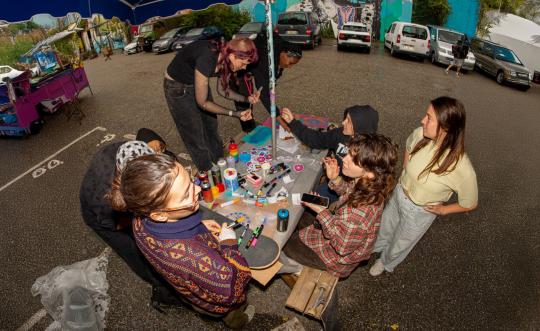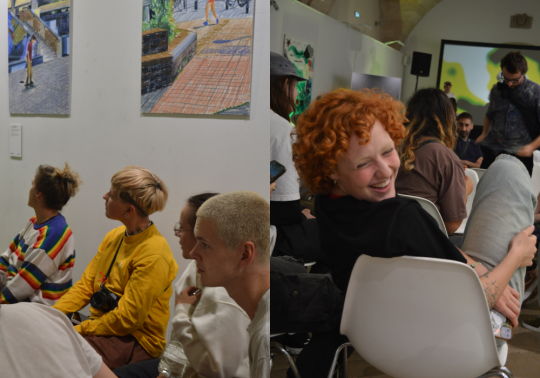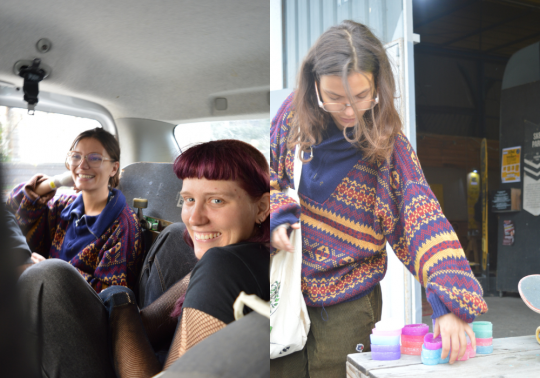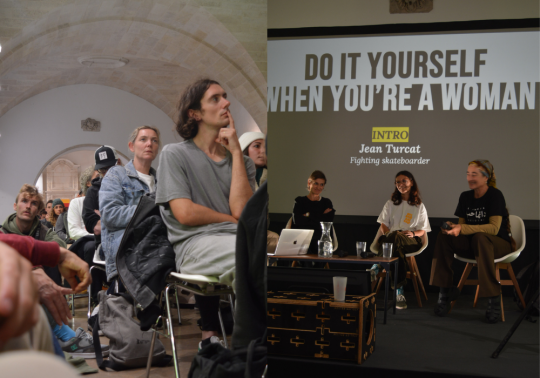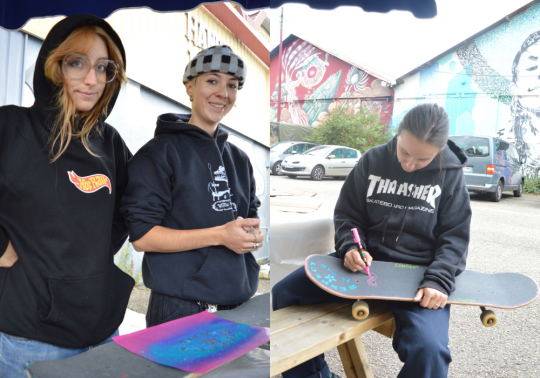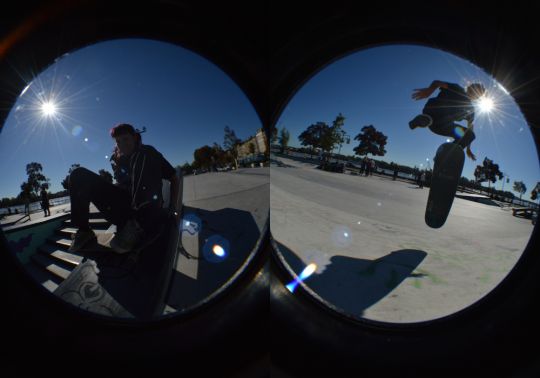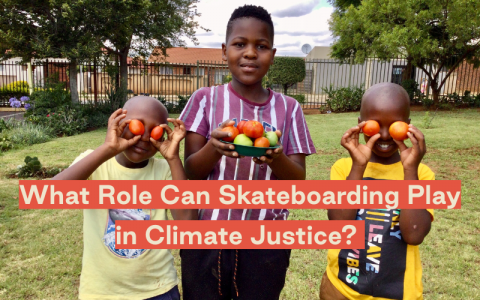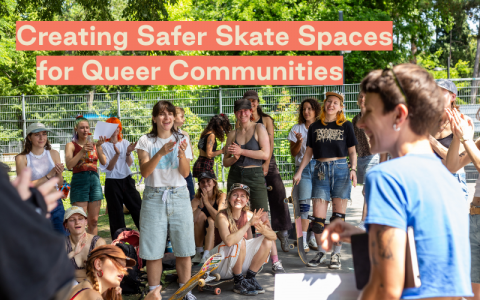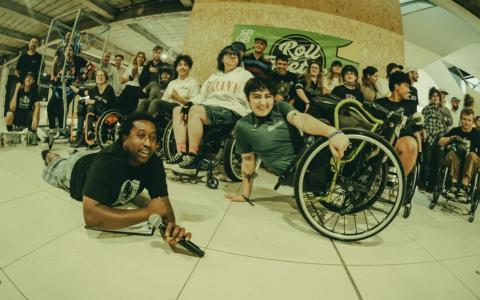Note: All quotes in red are from Graquandra’s opinion piece which was written after attending Connect Festival.
This October, we had the chance to represent the ROLL Models program at the inaugural Connect Skaturbanism Festival in Bordeaux. As part of a team committed to making skateboarding spaces more inclusive, we turned months of planning into a reality at this unique event celebrating the intersection of skate culture and urban development.
Skaters, academics, city planners and creatives alike gathered at the 4-day Connect Festival to explore skateboarding's integration into urban spaces — through panel discussions, film screenings, exhibitions, skateable sculptures and city tours. Bordeaux is a pinnacle example of the way combining skateboarding and urban legislation can enhance a city’s integrity and the reclaiming of public space. Ergo, a perfect location for the skateurbanism festival.
While the lineup highlighted skateboarding’s role in reclaiming public spaces, the festival’s initial setup reflected a pattern familiar in skateboarding spaces: a lack of diversity in representation. Recognizing this early on, we teamed up with other women and queer organizers months before the festival to push for change. Our goal was simple but crucial: make the event feel safer, more welcoming, and inclusive for non-traditional skaters.
Planning for Impact
Skateistan and Goodpush were invited by Léo Valls (one of the event organizers) to participate in the NGO space at Cour Mably, where the festival was held. Whenever the Goodpush attends skateboarding events, such as Pushing Boarders in the past, we try to maximise the opportunity by hosting side gatherings that bring together people from social skateboarding projects to share ideas and build connections.
For Connect Festival, we decided to take this a step further by creating an exciting opportunity for one ROLL Model: a funded position to join us in Bordeaux to represent the program and champion the inclusion of marginalized genders in skateboarding.
We received strong applications from past and current ROLL Models and based our selection on alignment with the festival’s themes and the core focus of the ROLL Models program: safer, more inclusive public skate spaces; mental health and wellbeing; and reclaiming spaces for marginalized communities. Based on these areas of interest and experience, Graquandra (Raquel Williams Vasquez) from The Baby G Experience SB was chosen to attend Connect Festival, joining Goodpush Program Coordinator Ruby Mateja to represent ROLL Models.
Building Safer Spaces
As plans for Connect Festival took shape, our team grew organically through connections with other non-traditional skaters passionate about creating inclusive spaces. Léna Germanese, a Bordeaux-based city planner and 2022 ROLL Model, was exhibiting her handmade sculptures at the festival and had begun organizing an inclusive skate session within the program.
At the same time, Goodpush was collaborating with the team at Consent is Rad to brainstorm the launch of their new campaign, Respect is Rad. With efforts spanning continents, we coordinated a joint campaign launch: Indigo Willing and Evie Ryder represented the campaign in Sydney, Gadigal Country, Australia, while Millie Miljevic joined us for the Bordeaux launch.
Sharing our commitment to diversity and inclusion, we were joined by Jessy Marine and Nadege Monge (a current ROLL Model) from SOA Paris. Just like that, we had our powerful little working group and began to meet every month in the lead up to the festival to plan how we could make it a more welcoming environment for non-traditional skaters.
Our proud achievements at Connect Festival include:
-
Researching and sharing resources for queer and budget-friendly accommodation options for attendees
-
Creating and sharing a Welcome Pack with key information about the city, how to get around, where to eat, emergency numbers in case of accidents or emergencies, and of course - some of the famous skate spots
-
Drafting and distributing Community Guidelines (beforehand and during the festival) to foster respect and safer spaces at the event
-
Ensuring the presence of the Ask for Angela safety service offered by Bordeaux city council
-
Organizing a non-traditional skaters' session to create a safer and empowering environment: Skate, Create & Connect: For Non-Traditional Skaters
-
Hosting a Goodpush x Respect is Rad creative workshop and conversation circle to open dialogue about inclusivity in skateboarding and urban spaces
Challenges Along the Way
A significant challenge we faced was emphasizing the need for safer spaces at the festival, particularly for marginalized communities, while encountering resistance from the organizers that this was necessary. Rather than dwelling on the pushback, we focused on what we could achieve independently. Graquandra shared that her local queer gym used an excellent set of community guidelines to foster safer and respectful behaviour. Inspired by this, we decided to create our own guidelines to show our commitment to upholding safer spaces at skate events (check out the free resources at the end of this blog post).
As we crafted the Community Guidelines and established protocols for handling incidents or disclosures, Lena suggested leveraging the Ask for Angela service offered by Bordeaux city council. This service, staffed by trained professionals, provides support for safety incidents and emergencies. By ensuring this resource was available at Connect Festival and distributing our Community Guidelines, we sparked important conversations among attendees about the value of safer spaces and the collective responsibility to uphold them.
This experience highlighted a broader issue: inclusion requires intentionality. Without diverse voices shaping an event, critical perspectives can be overlooked. Still, moments like these remind us why advocating for change matters.
Highlights of the Festival
Arriving in Bordeaux, we were immediately struck by the city’s beauty and how seamlessly skateboarding had been integrated into its urban design. The energy was palpable as skaters from different corners of the world gathered to celebrate and connect.
Despite the rain, our team pressed forward with our session: Skate, Create & Connect: For Non-Traditional Skaters. We moved the non-traditional skaters' session to Hangar Darwin (indoor) Skatepark to ensure it felt safe and accessible, and it turned out to be a colourful and uplifting event. Skaters of different backgrounds and identities came together, proving the power of creating space for everyone.
The Respect is Rad workshop was a big highlight — the group shared personal experiences about navigating inclusion in skate spaces whilst creating signs with messages they wished to share and spraying ‘Respect is Rad’ onto their boards.
Beyond our organized activities, it was inspiring to see moments of connection between everyone. Whether through skating, discussions, or simply sharing meals, there was a sense of community that reminded us all why we love skateboarding and the ways it brings us together.
Lessons Learned
While the festival was a step forward in many ways, it also underscored the work still needed to make skateboarding more inclusive. Representation matters—not just in who participates but also in who organizes, speaks, and shapes the narrative. As non-traditional skaters, we often operate within our own bubbles and close knit safe spaces. Although this is crucial sometimes, we definitely learnt the value of asserting ourselves into more traditional spaces so that we can make the essential first steps for inclusion there, bring allies into the conversation, and take up some deserved space!
There were many moments to celebrate at Connect Festival: seeing the impact of our Skate, Create & Connect session, hearing attendees express appreciation for the community guidelines, having allies in the audience speak up about lack of diversity on the panels, and watching the festival spark new connections and ideas.
Looking Ahead
The Connect Skaturbanism Festival was a reminder of both the challenges and possibilities in creating inclusive skateboarding spaces. As we continue to push for diversity, we’re reminded that change doesn’t happen overnight—yet every step counts.
This is why we have created some resources to share with the community so that we can support others in creating safer and more inclusive skate events:
- Organizer Guidelines for Safer Skate Events - This is a manual designed to help skateboarding event teams uphold best practices for accessibility and to prioritize the safety of all attendees, whether your event is a festival, competition, jam, quiz night, or conference. We encourage you to review these guidelines with your organizing team and use them as a reference for creating a safer space at your event.
- Then, use our Community Guidelines template to tailor a version specific to your event. This customized version can be shared online before the event and distributed as printed materials (either posters or flyers) on-site.
We’re proud of the work we contributed to this event and are grateful for the allies and friends who made it meaningful. Together, we’ll keep working toward a skateboarding culture where everyone feels seen, valued, and empowered. To anyone striving to make skate spaces more inclusive: let’s keep pushing forwards together!
Original opinion piece written by Graquandra & reworked into this blog piece by Ruby from Goodpush.
Banner image above taken by @sebastien_bnzt. All photographs throughout the piece taken by Graquandra.
